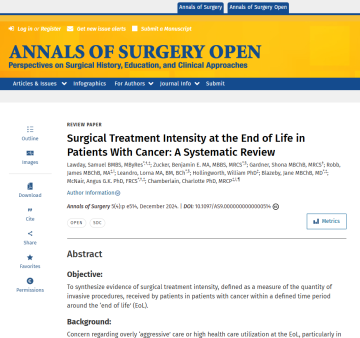Many cancer patients continue to undergo invasive surgeries at end of life
- 18 November 2024
A new systematic review has found that a large number of cancer patients continue to undergo invasive surgeries in their final months of life, even though it is unclear whether they benefit from them. The research does not confirm whether patients are being overtreated. However, findings suggest that surgical treatment intensity is both high and costly for these patients.
The review, which examined 39 papers mostly published after 2010, found that as many as 79 per cent of cancer patients received invasive procedures during the last month of their life. However, the reasons for these surgeries were often unclear, with many studies not stating whether the procedures were intended as a cure, to relieve symptoms or prolong life.
One of the key findings was that surgical treatments at the end of life varied greatly between patients, hospitals, and geographical regions. Factors such as the type of cancer, the patient’s age, income, and where they lived all influenced how likely they were to receive surgery.
For example, patients in larger hospitals or in more populated areas were more likely to undergo invasive procedures. The review also found that patients who were referred to palliative or hospice care, which focuses on comfort rather than curative treatments, were less likely to undergo surgery.
Researchers highlighted a lack of clear and consistent data as a major issue during their analysis. Studies did not agree on how to define the ‘end of life’ period, and there were different ways of measuring the intensity of surgery.
This made it difficult for researchers to draw firm conclusions about whether patients were being over-treated. Without clear information on the intent behind surgeries, it’s hard to know whether they were appropriate or not.
Dr Samuel Lawday, NIHR Doctoral Research Fellow and lead author, said:
“We need better research in this area with standardized methods defining when a patient is at the end of their life and clearer reporting on the purpose of surgical treatments.
“Improved data could help doctors make more informed decisions and avoid unnecessary surgeries that add to the emotional and financial burden of cancer patients and their families.”
